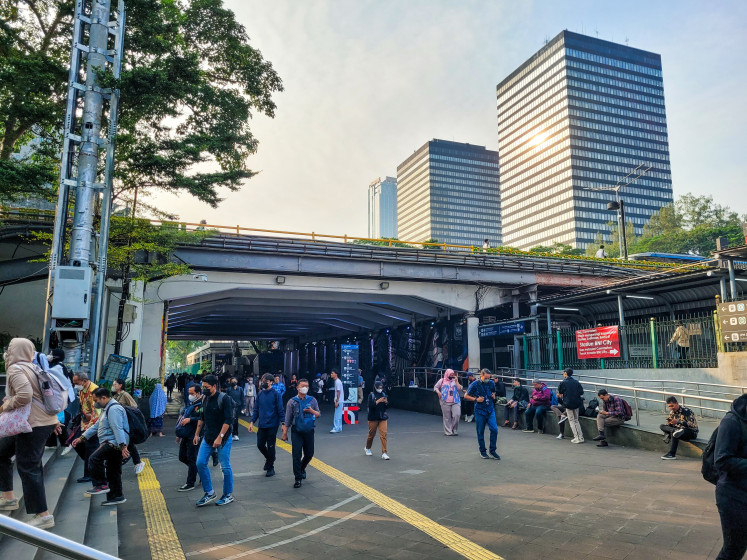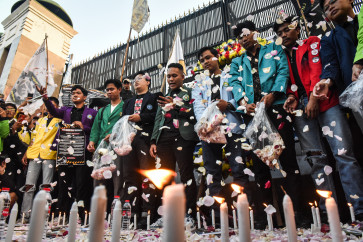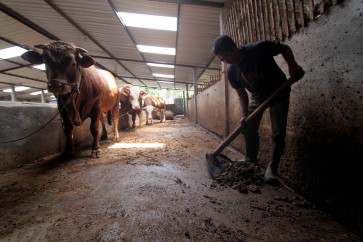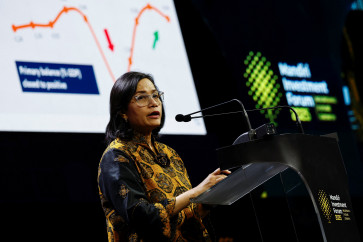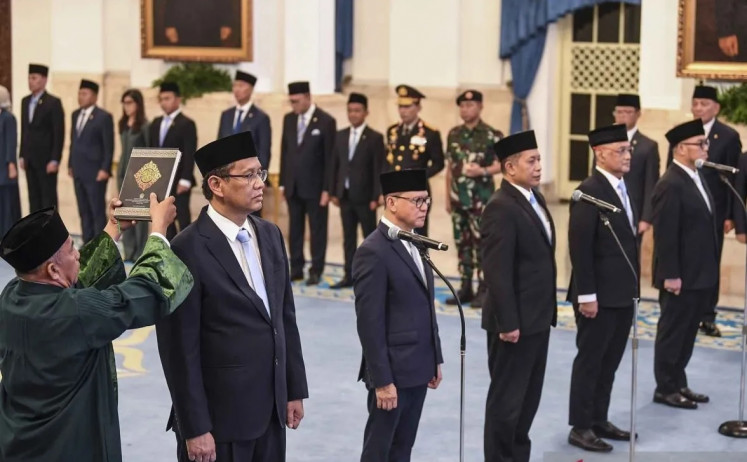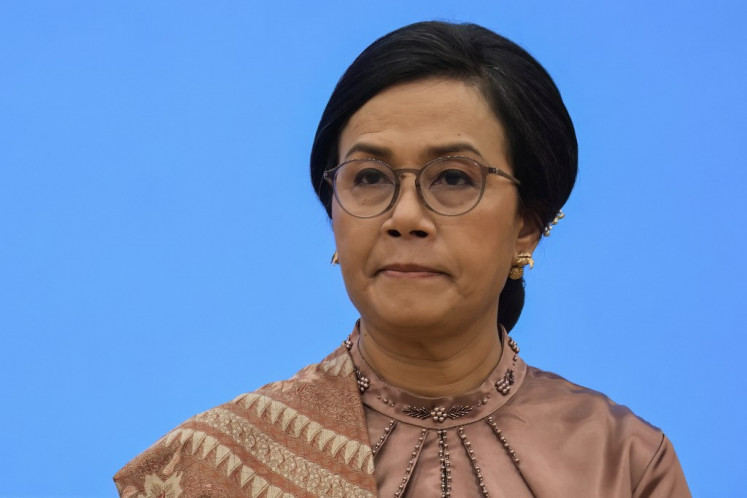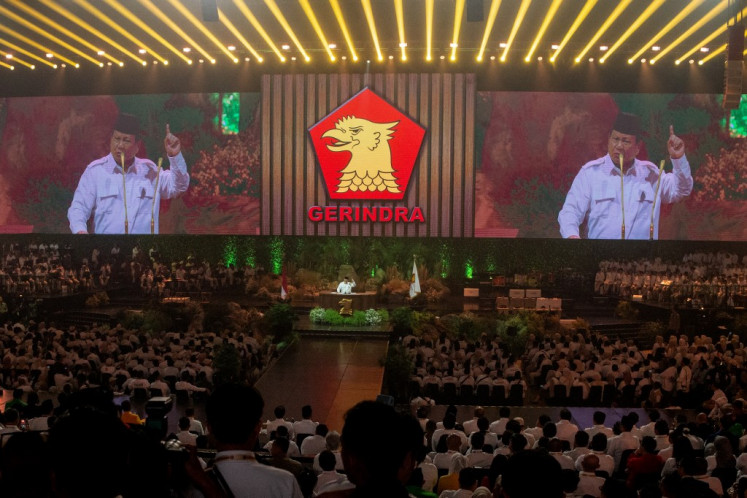Popular Reads
Top Results
Can't find what you're looking for?
View all search resultsPopular Reads
Top Results
Can't find what you're looking for?
View all search resultsIron in their blood
All in the family: Pande Putu Sunarta is helped in his blacksmithing by his wife, Pande Kadek Ari
Change text size
Gift Premium Articles
to Anyone
All in the family: Pande Putu Sunarta is helped in his blacksmithing by his wife, Pande Kadek Ari.
Hammers pound out a blacksmith's melody as two brothers sit by a forge crafting kris from red hot iron, just as their family has been doing on this very spot in Pande Sidan village for at least 500 years.
Working on an anvil handed down over generations, these men of the angandring (blacksmiths) guild have iron in their blood, as do their wives and children, all named Pande, marking them as smiths.
Family head Pande Putu Sunarta, his brother, Pande Made Suteja, and their wives and children are richly proud of their heritage and the knowledge that they continue an unbroken tradition that began as early as the 11th century in Java under the Majapahit Kingdom and later came to dominate almost all of Indonesia.
'At the time our family arrived in Bali there was only the Bali Mula here ' there were no cities at that time because kingdoms had not yet begun, so in a way our family helped in the establishment of the kingdom working as blacksmiths,' said Sunarta of the household utensils, farming implements and weapons crafted by his family that formed an integral element of developing settlements in Bali.
Iron work is so deeply ingrained into Sunarta's being that he believes his smith's tools and fire-breathing forge are continuations of himself, with different implements having a direct correlation with parts of his body.
'We believe in the seen and the unseen. These tools are real, the seen; but in my body there are the unseen symbols of these tools ' it is hard to explain, but you could consider the unseen as instinct. This anvil is my legs; the metal clamp is the fingers of my left hand; the fire poker, my right hand index finger; my hammer is my two clenched fists; my iron cutter is my molars and my metal file is my two front teeth. The file is like the one we use in teeth filing. The fire is from my eyes and the salt water used to harden the iron is my sweat ' so my tools are an extension of my body. My brother feels the same,' says Sunarta, who learned this esoteric knowledge from his ancestors.
Alive: These smith's tools awaken under skilled hands when called on to work.
He explains while there are many blacksmiths, this knowledge is only for those who make kris. 'It is not for those who make farm tools and household tools,' says Sunarta, who like his younger brother, is known as Jero Pande, a title conferred on the most skilled smiths who are able to craft the sacred and magical kris believed to protect families from demons and black magic and that are still a necessary item in most Balinese households.
Before beginning or continuing work on a kris, Sunarta sits cross-legged by his forge, his tools for the day's work laid out in front of him. Offerings are made, and then one by one Sunarta takes up a tool and prays. 'We pray to bring to life the tools of our body, our teeth, our legs, hands and fingers and transfer that life force to our tools to bring them to life ' to awaken them,' says Sunarta. Only the tools needed for the work at hand are woken. The rest are left to slumber undisturbed until their turn at the forge.
Watching Sunarta with his tools ' praying for a hard metal that is so often associated with violence ' is deeply moving. A great softness falls about Sunarta as he splashes each iron tool with holy water borne on the petals of a frangipani flower. The iron becomes malleable in the forge and seems to almost live and breathe for just a few moments, as the brother's hammers bring a new kris into being.
Today Sunarta and Suteja are continuing work on a Damar Ngode three-luk kris for their family.
'This is the living light kris ' it brings the light of heaven to our family,' says Sunarta who as a young man turned his back on family tradition and trained as a biology teacher.
'I wanted to live a better life, a more modern life, and my education as a biology teacher had no relationship with smithing. One day I bought a kris at the market for my son's topeng dance. My father who gave me life never went to school, but that kris shattered in my father's hand. He asked me to make my son a kris. That was the beginning,' says Sunarta.
Glowing: Iron grows malleable in the forge.
He said that he prayed to his ancestors and was struck by an 'apocalypse when the ancestors gave me license and guidance to make this kris that my son still uses in his dance,' says Sunarta, whose 16-year-old boy, Pande Putu Yogi, is proud to learn the skills of his forbears.
'I feel honored knowing my family have lived on this spot for centuries and I am proud we can make keris and this all came from our ancestors,' says Yogi, whose mother, Pande Kadek Ari, also hails from an ancient blacksmith family. Ari often helps her husband at the forge.
'Until now, women have not learned to make kris, but they do help to hammer the iron. I feel that when my wife helps in this work to make a special kris, it is easier for me to access the unseen and to make my body sacred. Working with my wife brings the lingga and yoni together, so it is deeply spiritual,' says Sunarta whose daughter, Pande Kadek Yosi Ari Pramasti, plans to follow in the steps of her mother and grandmothers before her.
'I want to learn to help in the smithing like Mom did, because I want to continue the work of Mom and Dad and our ancestors. I am of the new generation of my ancestors. I am proud to live on the ground of my ancestors, because here we have heaven on earth,' the 14-year-old said.
'It it is hard to explain, but here I am surrounded by the people I love and I am happy because I can feel our ancestors' love and that they are watching over us,' says Yosi, who bears in her veins the iron age of history.
Like father: Following in his father's footsteps as a blacksmith is Pande Putu Yogfi.
Life-gives: Iron softens under Pande Putu Sunarta's prayers to bring his tools to life.
Craftsman: Blacksmith Sunarta cuts red hot iron with a tool he says is an extension of his teeth.
' Photos by J.B.Djwan





